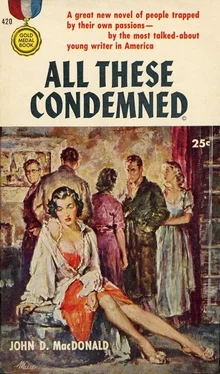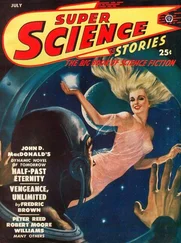I wish I could stop thinking about it. It comes up at the damnedest times. When I ought to have my mind on what I’m doing.
This isn’t a bad job, and I’d like to keep it. But if I keep goofing off, going ’way back there and thinking how I ran, I’m going to flub stuff, the way I messed up the timing yesterday meeting that train. And lose this job.
It isn’t a bad job. There are twelve theatres in the chain. But now Mr. Walsh has got this idea I should dress up like a damn Martian and walk up and down in front of the Times Square house for this 3D horror thing. I keep telling him it’s a job for an usher or one of the assistant managers, but he keeps telling me I’m the publicity guy, aren’t I?
It was just like the way you’d snatch your hand off a hot stove. You don’t stop and think about it first, do you?
I’d argue more, but I keep thinking about that Sunday morning.
Do you?
Chapter Thirteen
(Wallace Dorn — Before)
Years ago I put my foot down. Firmly. It isn’t that I do not love Florence. She is my wife. She has carried and given birth to my children. But I had to forbid her presence at any of those social functions that are connected with my position at Fern and Howey.
I could not function properly while I waited in sick dread for her to put her foot in her mouth. And she always did. Invariably.
It isn’t as though I keep her in a locked room. We have our own circle of friends and, thank God, none of them has anything to do with advertising, publishing, or the arts. They are plain people. There is nothing brittle or self-consciously clever about them. And I am very glad that most nights I am able to catch the five-twenty-two out of Grand Central Terminal.
Florence is a comfortable woman. There was a time, of course, prior to and for about a year after our marriage, when I thought she was an enormously exciting woman. It is easy to see now that what misled me was her great vitality. Her hair is red and her skin is very white, and her looks faded very quickly. She seemed to turn, in a few short months, from girl bride to heavy-set matron. But, though I was disappointed at the time, I would not have it otherwise. She knows my wants. She keeps the home neat, cooks well, is good-humored, and very pleasant with the children. They are healthy children.
Florence is not an intelligent woman. She has a certain native shrewdness, but no mental equipment with which to cope with the people I must deal with each day. I am the head of my household. I have seen to it that there is no doubt about that. Someone must command. Otherwise there is fuss and disorganization.
I have made it a point not to mention her or the fact of my marriage and my children to my coworkers. Thus many of them are astonished when they learn that I am married. They try to include her in invitations. I say she is not well. That, of course, is a lie. She is as strong as a good horse.
I have been, I believe, a good husband to her. My salary has increased steadily, though it has never been, and perhaps will never become, spectacular. Except for Ferris, the accounts I handle with Fern and Howey are small. I have an even temper around my home. I give Florence a rather generous allowance. Though I have been unfaithful, I consider those lapses as being, perhaps, an inevitable by-product of my occupation, and commend myself on the fact that there have been so few such episodes. No more than nine, I believe, during sixteen years of wedded life.
Each morning she drives me to our small rustic station and I get on the train, and during the forty-minute ride I compose myself for the work of the day and prepare the face I will show to the world. I pledge myself to go through each day with quiet dignity, with as much honor as is possible, with affability and understanding of the problems of others.
And it was with that same attitude that I arrived at Wilma Ferris’ place at Lake Vale. But despite all vows, sometimes one finds oneself in a situation where dignity and honor are denied you. I despise such people, every one, except, perhaps, Paul Dockerty. He retains some of the instincts of a gentleman. Though, in a few more years, he too will be lost. I can save myself because I have a retreat. Each night I can go to my home, to my chair and pipe and robe, to the relaxation of a modicum of excellent Scotch, to quiet conversation, to a game of chess with my neighbor.
I knew, of course, that Wilma had poisoned Mr. Howey against me. And I knew that in inviting me she undoubtedly had more unpleasantness in mind. I even suspected that she wished to tell me that she was shifting her account to some other firm, perhaps to some brash outfit completely lacking in the dignity that has characterized Fern and Howey dealings since the establishment of the agency in 1893 by the elder Mr. Detweiler Fern. But I could not allow myself to think of such a contingency seriously. The implications were ghastly. Though Mr. Howey is, I trust, a man of honor, I believe he would feel that he should chastise me severely for the loss of the profitable Ferris account.
Though I did not care for the people, I enjoyed the opportunity of playing games. It took my mind away from the continual problem of what to do if Wilma did what I thought she might do. Scrabble is hardly a challenging game from an intellectual point of view. There are none of the clean rhythms and sequences of chess. I found Dockerty and the Jonah girl rather dull at it, and won handily.
When I said good night to Wilma, just as her game of gin rummy — infantile occupation — was breaking up, she gave me a glance as shrewd and alien and darting as the glance of a snake. It chilled me. After I was in bed I still felt cold. How have I offended her? I want nothing but the security of my job. Am I not good at my job? The Durbin Brothers, and Massey, Grunewald, and Star, and Bi-Sodium and Tichnor Instrument — they have always been satisfied. Every one.
The croquet game the next day was almost pleasant. It would have been far more pleasant had the others kept their minds on the competition. They seemed to have no great urge to win. They clowned grotesquely, and I was most disappointed in Paul Dockerty, getting as drunk as he did. I figured the proper angles, and the odds, and played crisply and well, finishing my circuit first, but avoiding the stake so that I could range back out across the court and aid the laggard members of my team as best I could. Wilma walked close to me at one point and put me badly off my form by murmuring, “Talk to you later, Buster.”
Of all the possible names she could have selected for me, she picked the one most calculated to distress me. It is a name completely without dignity. While still tense and worried about her, I played badly, and my ball was captured and driven into the water. I retrieved it and, setting it down in the parking area, I regained the playing field with one stroke, and hit the stake firmly with my next stroke after seeing that my further efforts would not aid my teammates. I was pleased to see that we won.
Wilma saw me in her room before lunch. She had me sit down. She had a cigarette and she walked back and forth, from the door to her dressing table, walking in silence as my tension mounted.
“Miss Ferris, I...”
“Please hush, Buster. I’m thinking.” That is typical of her. No form, no courtesy. Striding back and forth, ranging like a big cat in a cage, wearing that naked-looking sunsuit, the long muscles in her legs pulling and tightening with her strides, her dark hair bouncing.
Finally she stopped and faced me, looking down at me. “O.K., I’ve decided there’s no nice way to tell you. Dockerty is doing a job as far as he can. But that creepy agency you work for is dead weight.”
“Fern and Howey are one of the—”
Читать дальше









![Джон Макдональд - Wine of the Dreamers [= Planet of the Dreamers]](/books/430039/dzhon-makdonald-wine-of-the-dreamers-planet-of-thumb.webp)


